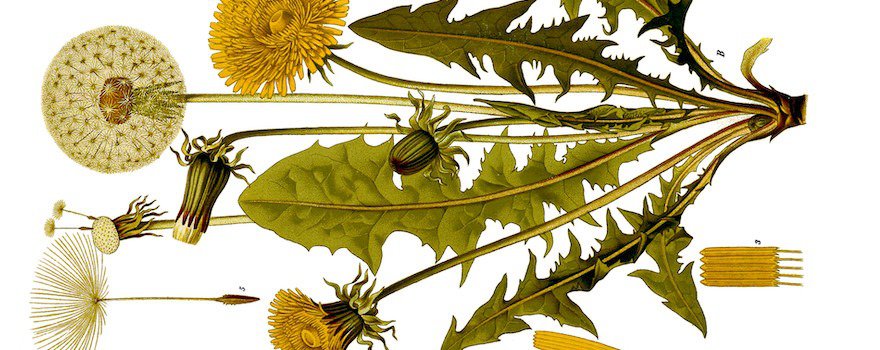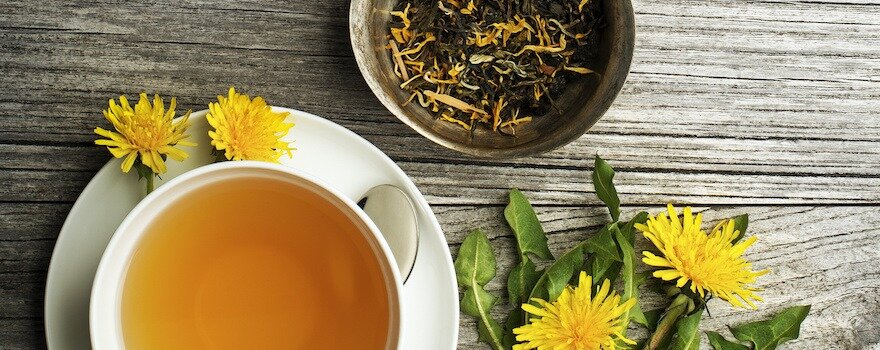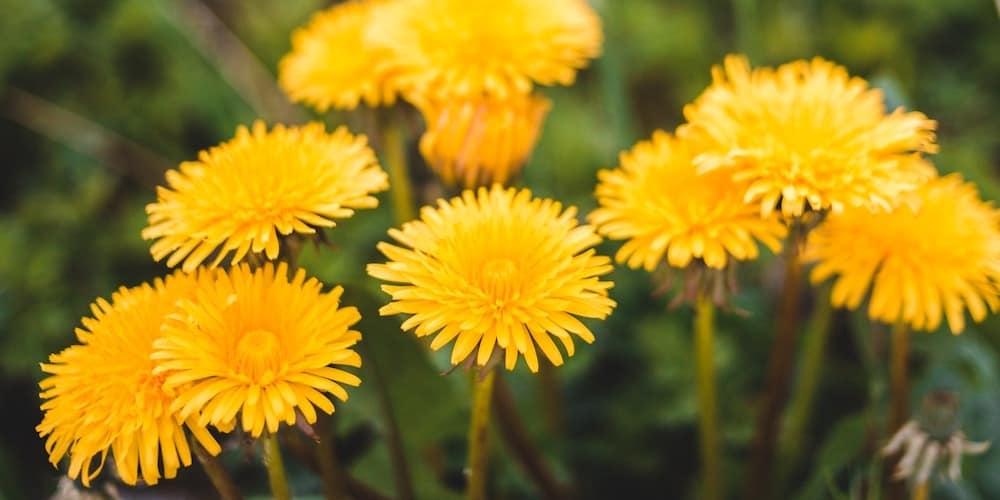What is dandelion?
Like nettle and horsetail, dandelion is a common plant in our gardens. It belongs to the Asteraceae family and the botanical genus Taraxacum.
This includes different species, the most famous of which is Taraxacum officinale or “common dandelion”.
Widespread in Europe, it grows in gardens, meadows, roadsides… It is easily recognizable by its yellow flowers that appear from April to September. Its serrated leaves have earned it the nickname “lion’s tooth.”
Dandelion is an important plant in herbal medicine. Known since ancient times, it is used in many traditional medicines.
Its roots and leaves contain various active ingredients (proteins, vitamins, minerals, antioxidants…) that provide it with medicinal properties.
Thus, it is one of the best natural diuretics that promote the draining and elimination of toxins. Consumption also helps to stimulate appetite, improve diabetes, and relieve digestive disorders. Finally, it shows anti-cancer potential.
Nutritional composition
- Amino acids
- Vitamins: provitamin A (beta-carotene), B1, B2, B6, B9, C, E
- Minerals and trace elements: magnesium, potassium, iron, manganese, calcium, phosphorus, sodium, copper, silica
- Proteins
- Carbohydrates
- Fibers
- Fatty acids
- Antioxidant compounds: sterols, flavonoids, polyphenols, carotenoids, taraxasterol
- Organic acids: chicoric, chlorogenic, malic, malonic, tartaric, citric, quinic, succinic, acetic, formic acids

The benefits of dandelion
🍽 Stimulates appetite
Its consumption is indicated to treat the lack and loss of appetite. It is notably used in chemotherapy patients, which often causes anorexia. Thus, it prevents weight loss while promoting food intake.
Thanks to its bitter components (sesquiterpene lactones), it has an aperitif action. It is also choleretic and cholagogue. Thus, it stimulates bile secretion and biliary functions, which play a direct role in appetite.
This study from Kyung Hee University in Seoul (Korea), conducted on cancer patients, shows how dandelion stimulates appetite.
💦 Diuretic
The plant’s leaves are particularly rich in potassium (about 400 mg per 100 g). This mineral helps in diuresis, which is the formation and elimination of urine by the kidneys and bladder.
Thus, dandelion causes an increase in urinary frequency and volume, useful for treating some diseases like kidney stones. Its diuretic action also makes it effective in cases of water retention and edema.
This study from the Tai Sophia Institute in Laurel (USA), conducted on humans, shows the diuretic effects of dandelion.
♻️ Relieves digestive disorders
In herbal medicine, it is recommended to relieve dyspepsia and various digestive disorders: slow and difficult digestion, constipation, flatulence, and intestinal bloating…
On one hand, its bitter principles give it stomachic virtues that improve digestion and support stomach functions.
On the other hand, it contains fiber (about 3 g per 100 g) that contribute to the proper functioning of the intestine. Finally, it stimulates the growth of probiotic bacteria (bifidobacteria) within the intestinal microbiota.
This study from the Czech University of Agriculture in Prague (Czech Republic), conducted on bacterial strains, shows the action of dandelion on the microbiota.
🍭 Improves diabetes
Its consumption allows better control of type 2 diabetes (sugar diabetes). A benefit it owes to the chicoric and chlorogenic acids, taraxasterol, and sesquiterpene lactones in its roots.
On one hand, it reduces blood sugar levels and helps regulate blood glucose. On the other hand, it stimulates the pancreas to produce insulin.
This review from Aarhus University Hospital (Denmark) shows the antidiabetic activity of dandelion.
🔬 Potentially Anti-Cancer
The plant contains numerous antioxidant compounds with potential anti-cancer properties. As such, it is rich in vitamin A (beta-carotene), polyphenols, and flavonoids.
These compounds inhibit the proliferation of diseased cells. Moreover, they stimulate tumor necrosis factor (TNF-alpha), which is involved in combating cancer cells. Finally, they induce apoptosis (programmed cell death).
This study from Essen University Children’s Hospital (Germany), conducted on cells, shows the anti-cancer potential of dandelion.

How to consume dandelion?
Dandelion in capsule form
Capsules contain powdered leaves or roots of dandelion. Roots are more indicated to relieve digestive disorders, diabetes, and stimulate appetite. Leaves, on the other hand, have more effect on the urinary system.
It’s a convenient, easy-to-take format that does not have the bitterness of the powder. If possible, opt for capsules of plant origin.
Dandelion in powder form
Parts of the plant are harvested, dried, and finely ground to obtain a powder. Again, it can be powder from dandelion leaves or roots. Choose the one that best suits your needs.
The powder mixes easily in a glass of water. To mitigate its bitter taste, you can also consume it in fruit juice, vegetable juice, or plant-based milk.
Dried dandelion
You can find dried leaves or roots. This format is ideal for making decoctions and diuretic herbal teas.
Use one tablespoon of dried roots or leaves for 200 ml of water. Let it steep for 10 minutes and enjoy. Sugar, honey, or lucuma powder will sweeten its bitter taste.
Dandelion in mother tincture
In this case, the entire flowering plant is used. The mother tincture is obtained by hydroalcoholic extraction. This format is rich in active ingredients but contains alcohol. Therefore, it is not recommended for pregnant women, children, or people suffering from certain health conditions.

Consume sustainably: prioritize organic, local, and fair-trade dandelion
✓ Vous pouvez en cueillir facilement à l’état sauvage. Récoltez les feuilles jeunes, au printemps, et les racines au printemps ou en automne. Privilégiez les lieux préservés de toute pollution et traitements chimiques (pesticides, herbicides…).
✓ De nombreux producteurs français cultivent aussi du pissenlit. Dans ce cas, privilégiez l’agriculture biologique.
Dosage
The recommended dosage is 30 g of leaves and 15 g of roots per day.
Contraindications and side effects
Consuming dandelion presents certain contraindications:
- As a precaution, it is not recommended for pregnant and breastfeeding women and young children;
- People suffering from gallstones, kidney failure, or heart diseases should consult their doctor before consuming it;
- Its consumption may interact with diuretic medications. Consult your doctor if you are undergoing treatment;
- People allergic to plants in the Asteraceae family may be sensitive to it.
Consuming dandelion presents certain side effects:
- Stomach aches
- Skin rashes
- Diarrhea
If you experience side effects, stop consumption and consult a doctor.
Sources and scientific studies
Katrin Schütz, Reinhold Carle, Andreas Schieber, 2006. Taraxacum–a review on its phytochemical and pharmacological profile.
Sang-Mi Woo, Kang Min Lee, Gyu Ri Lee, Ji Youn Park, Hee Jae Lee, Hyo-Jung Bahn, Hyun Seok Yoon, Jem Yung Kim, Young Cheol Shin, Sung-Gook Cho, Seong-Gyu Ko, 2018. Novel herbal medicine LA16001 ameliorates cisplatin-induced anorexia.
Bevin A Clare, Richard S Conroy, Kevin Spelman, 2009. The diuretic effect in human subjects of an extract of Taraxacum officinale folium over a single day.
I Trojanová, V Rada, L Kokoska, E Vlková 2004. The bifidogenic effect of Taraxacum officinale root.
K Menke, M Schwermer, J Felenda, C Beckmann, F Stintzing, A Schramm, T J Zuzak, 2018. Taraxacum officinale extract shows antitumor effects on pediatric cancer cells and enhance mistletoe therapy.



